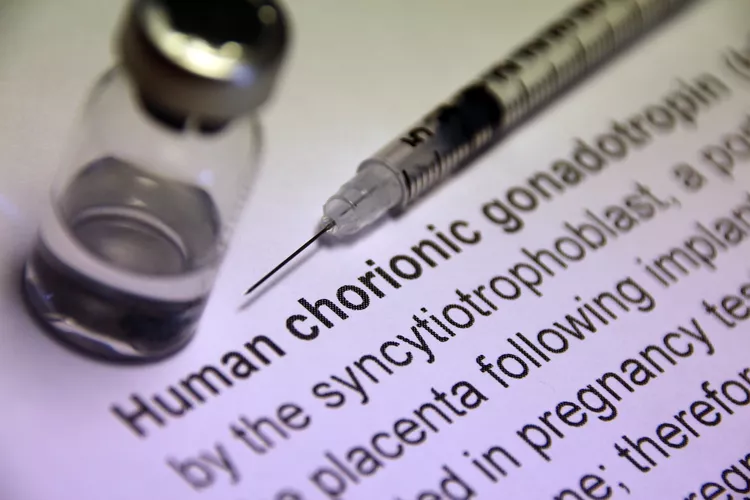HCG injections have been approved by the Food and Drug Administration (FDA) for treating specific medical conditions. For individuals designated female at birth (DFAB), these injections can assist in addressing infertility issues. For those designated male at birth (DMAB), they are authorized for managing a particular type of hypogonadism.
Human chorionic gonadotropin (hCG), commonly known as “the pregnancy hormone,” plays a vital role in maintaining pregnancy.
Pregnancy tests measure hCG levels in either urine or blood to determine pregnancy status.
Continue reading to learn about its applications for individuals designated male at birth (DMAB).

What are the uses of hCG in men?
Physicians may prescribe hCG to men for various therapeutic purposes.
Treatment of hypogonadism
For men exhibiting hypogonadism symptoms, hCG can be prescribed to address issues like low testosterone levels and infertility. hCG administration stimulates the body’s natural production of testosterone and sperm, thereby helping to mitigate infertility problems.
Management of testosterone deficiency
In some cases, hCG injections serve as an alternative to testosterone therapy for DMAB individuals with testosterone deficiency.
Testosterone deficiency is characterized by blood testosterone levels below 300 nanograms per deciliter (ng/dL) accompanied by symptoms such as fatigue, stress, reduced sexual desire, and mood disturbances.
Per the American Urological Association, hCG is appropriate for DMAB individuals with testosterone deficiency who wish to maintain fertility. Unlike testosterone products that may cause side effects like testicular shrinkage, altered sexual function, and infertility, hCG can enhance testicular size, testosterone levels, and fertility.
Some medical professionals recommend combining testosterone with hCG to alleviate testosterone deficiency symptoms while minimizing certain side effects associated with testosterone therapy.
Enhancement of sexual function
hCG may improve sexual function in DMAB individuals who don’t respond adequately to testosterone therapy alone.
Mitigation of steroid side effects
Bodybuilders using anabolic steroids, including testosterone, sometimes incorporate hCG to counteract certain steroid-induced side effects like testicular shrinkage and infertility.

How does hCG boost testosterone levels?
In men, hCG functions similarly to luteinizing hormone (LH). LH stimulates Leydig cells in the testes to produce testosterone.
Additionally, LH promotes sperm production within the seminiferous tubules located in the testes.
As hCG stimulates both testosterone and sperm production in the testes, it gradually increases testicular size over time.
How can I assess my testosterone levels?
Individuals can conveniently obtain testosterone tests online through DiscountedLabs.com, providing an accessible method for monitoring potential testosterone-related concerns. This proactive approach facilitates better health understanding and informed decision-making. DiscountedLabs offers a comprehensive selection of blood tests, including diabetes screening, annual physical panels, cholesterol checks, erectile dysfunction assessments, fertility testing, kidney function evaluations, PCOS testing, thyroid panels, and more, enabling thorough health monitoring.
What does current research indicate?
Limited clinical studies have examined hCG effects in DMAB individuals with low testosterone.
A small 2002 study involving older DMAB men with partial hypogonadism showed hCG increased testosterone levels compared to placebo, though it didn’t affect sexual function.
A 2005 study demonstrated that DMAB men taking both testosterone and hCG maintained testicular testosterone production.
A 2013 study found DMAB men using testosterone and hCG concurrently preserved adequate sperm production.
A 2018 study concluded hCG, whether used alone or with testosterone, helps DMAB men with hypogonadism maintain fertility and can potentially restore sperm production.
A small 2019 study determined hCG was safe and effective for DMAB men with hypogonadism symptoms but testosterone levels above 300 ng/dL (considered normal range).
Potential side effects
Common side effects of hCG injections in men include:
- Gynecomastia (male breast development)
- Injection site discomfort, redness, and swelling
- Abdominal pain
- Nausea
- Vomiting
Rare cases may involve blood clot formation. While uncommon, allergic reactions ranging from mild rashes to severe anaphylaxis may occur.
Is hCG effective for weight loss?
While sometimes marketed for weight loss, particularly in over-the-counter homeopathic hCG products, the FDA hasn’t approved hCG for this purpose.
The FDA warns against using hCG products for weight loss, as they lack approval and sufficient evidence of efficacy.
These products are often associated with extreme “hCG diets” restricting calories to 500 per day. While such severe calorie restriction causes weight loss, no evidence supports hCG’s role in this process.
Extremely low-calorie diets can be dangerous, potentially causing gallstones, electrolyte imbalances, and heart rhythm abnormalities.
Is hCG safe to use?
When administered under medical supervision, hCG is generally safe.
However, DMAB individuals with prostate cancer, certain brain cancers, or uncontrolled thyroid disorders should avoid hCG.
Consult your physician about any existing medical conditions before using hCG.
Since hCG derives from hamster ovary cells, those allergic to hamster protein should not use it.
Avoid OTC hCG products, as none have FDA approval. The FDA specifically warns against these products and the hCG diet.
Key takeaways
hCG is an FDA-approved medication for treating specific conditions in both DFAB and DMAB individuals.
For men, it serves as a testosterone alternative that boosts levels while preserving fertility.
Some clinicians prescribe hCG with testosterone therapy to maintain fertility and sexual function in testosterone-deficient men.
While sometimes used for weight loss (particularly in hCG diets), insufficient evidence supports this application, and safety concerns recommend against it.
Affordable lab testing resource:







